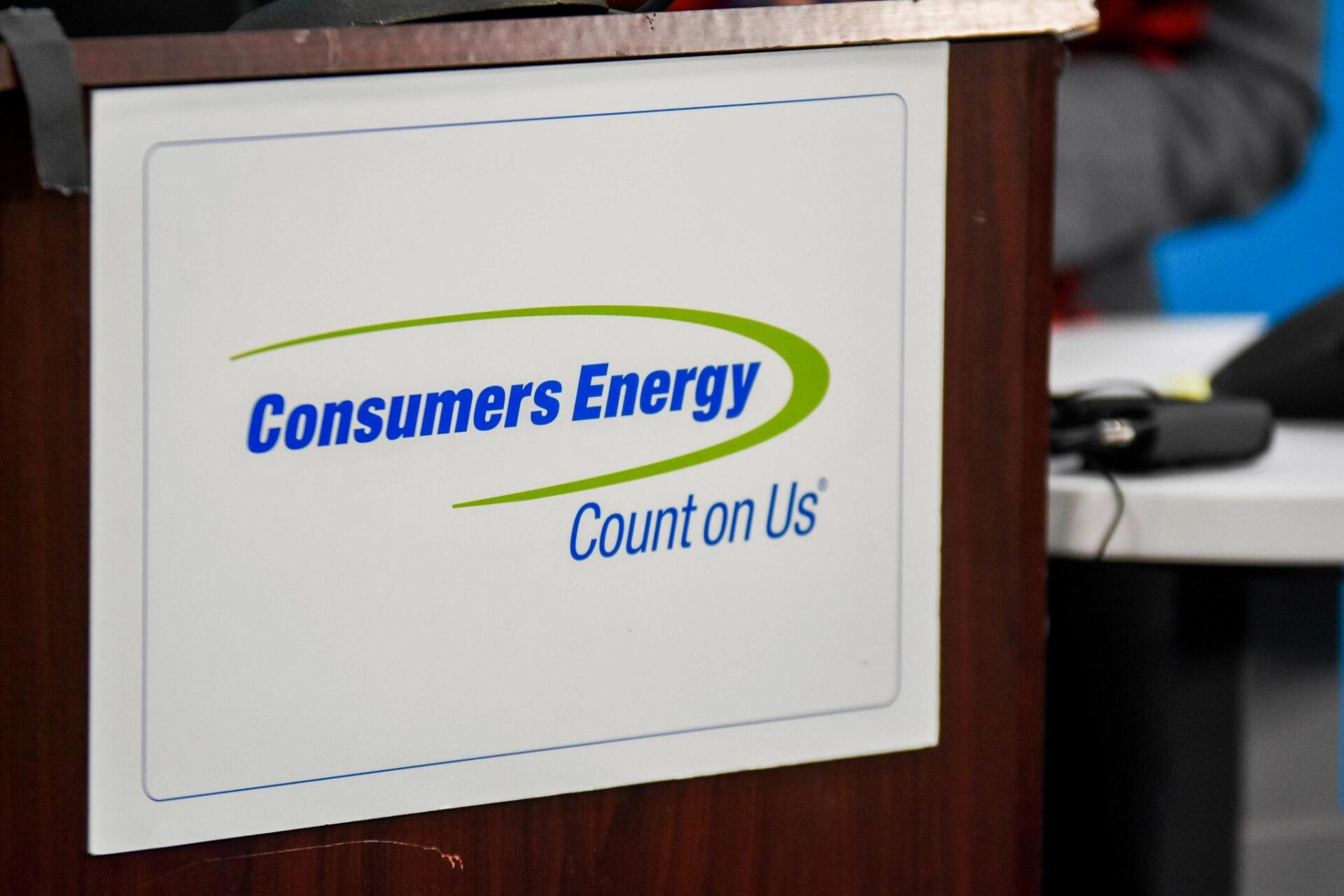Consumers Energy bankrolling opposition to Michigan political spending limits

Consumers Energy’s parent company has donated half the money raised so far by a campaign fighting a Michigan ballot initiative that would restrict utilities’ political spending, recent disclosures show.
CMS Energy pumped $15,000 into Protect MI Free Speech, the committee formed to oppose the Michiganders for Money Out of Politics ballot initiative. The other $15,000 backing the opposition campaign came from health insurance giant Blue Cross Blue Shield of Michigan, which would also be prohibited from making campaign contributions under the proposal.
The Michiganders for Money Out of Politics framework would ban regulated utilities like Consumers Energy from giving money to state officeholders and political party committees. The prohibition would also extend to corporations with state or local government contracts worth more than $250,000 annually, like Blue Cross Blue Shield. Under the framework, dark money 501(c)(4) nonprofits – including a prominent one affiliated with Consumers Energy – would be required to disclose pre-election ad spending.
Organizers aim to gather 356,958 signatures from Michigan voters by late February to ensure their proposal can be put to voters on the November 2026 ballot. The coalition pushing the proposal includes Clean Water Action, Climate Cabinet, Community Change Action, Detroit Action, Michigan League of Conservation Voters, Michigan United Action, MOSES Action, Progress Michigan, and Voters Not Politicians.
Utility influence is a key driver of ballot initiative
Consumers Energy and DTE Energy, Michigan’s two largest corporate monopoly utilities, are among the most influential political forces in the state. Through their Political Action Committees (PACs), the two utilities have reported more than $1.7 million in contributions to current elected officials across their political careers, according to an Energy and Policy Institute analysis of campaign finance reports.
The review found that 122 of 148 current state legislators – or 82 percent – have received utility PAC money. Democratic Gov. Gretchen Whitmer tops the list with $151,315 in utility PAC giving through October 2025. She appoints the regulators who oversee Michigan utilities, and who determine how much they can raise rates and how much they can profit. These proceedings have grown increasingly contentious in recent years as Consumers Energy and DTE Energy seek frequent rate increases while customers experience frequent outages, relative to other utilities in the region.
Earlier this year, Whitmer faced blowback for effectively ousting a well-respected regulator, Alessandra Carreon, and replacing her with Shaquila Myers, a political ally who pushed for utility priorities in her previous role as a top legislative aide.
After Whitmer, Republican Senate Minority Leader Aric Nesbitt – a Republican gubernatorial candidate – is next in line with $142,825 in utility PAC contributions through October 2025. Like their peers in other states, the Michigan utility PACs have historically given to elected officials in both parties, often funneling the most to those in leadership positions who have the most sway in shaping the legislative agenda.
To date, legislative efforts to rein in Consumers Energy and DTE Energy have largely stalled out, including a bill that would’ve restricted their political spending without the ballot drive now underway. Utility PAC giving has coincided with pivotal votes on key energy bills, prompting environmental justice and clean energy advocates to blame inaction on utilities’ outsize influence in Lansing.
“While Michigan families continue to pay the highest rates in the Midwest for the worst service, DTE and Consumers are writing check after check to lawmakers helping their CEOs protect this broken status quo,” Bob Allison, deputy director of the Michigan League of Conservation Voters, said earlier this year. “Michiganders of all political stripes chafe at our elected leaders being so blatantly influenced by the very utilities they, by law, are responsible for overseeing on behalf of us.”
Utilities channel millions of dollars more through dark money groups
Beyond the contributions made through their PACs, both Consumers Energy and DTE Energy have funded dark money 501(c)(4) nonprofit organizations that amplify their political giving, or their senior employees have led those groups. By using dark money groups, corporate interests can make donations, in secret, that exceed campaign finance limits. The groups also place ads designed to influence election outcomes.
These 501(c)(4) nonprofits – notoriously secretive, and designed to obscure how the money flows – would face greater scrutiny, and exposure, if the proposed ballot initiative passes. It would mandate disclosures of ad spending in the leadup to elections, commonly placed in service of utility-friendly candidates and their preferred policy outcomes.
While the utilities have insisted such nonprofits operate separately from them, their ties are clear.
One such dark money group, Citizens for Energizing Michigan’s Economy (CEME), has received over $43 million in contributions from Consumers Energy, whose executives and lobbyists sit on its board. CEME has contributed tens of millions of dollars to politically connected organizations over the past decade, while its spending on election season ads prompted a complaint filed with the Internal Revenue Service that questioned the legality of CEME’s activities.
Likewise, DTE Energy lobbyists and executives comprise the board of Michigan Energy First (MEF), a 501(c)(4) nonprofit that has pumped millions of dollars into funds affiliated with state officials and into advertising campaigns designed to influence state elections and policy decisions. Records daylighted in a criminal court case earlier this year showed a DTE Energy staffer was coordinating dark money donations on behalf of MEF using her DTE email account.
For those watching Michigan politics in recent years, the links are not surprising. After former Michigan House Energy Chair Gary Glenn, a Republican, took a hard line against Consumers Energy and DTE Energy priorities and profits in 2018, utility-affiliated dark money groups spent an estimated $1 million on a campaign to unseat him – a massive amount for a single legislative race.
Glenn lost, and with CEME in particular sitting on a multimillion-dollar war chest, Consumers Energy continues to loom large in state politics. Its most recent tax filing shows CEME was holding onto $12.7 million in assets as of December 2023 – a sizable war chest given typical spending in legislative races. MEF reported $7.6 million in assets at the end of 2023.
“By hanging my hide on the wall, utilities will intimidate even more legislators. Many legislators walk around scared of their own shadow when it comes to utility lobbyists,” Glenn told Midwest Energy News after his loss. “I am more disappointed in that than I have been about having lost the race — the fact that they’ll be able to intimidate other lawmakers by pointing to what they did in my race.”
Since then, both utilities’ dark money affiliates have continued to run ads during campaign season. They have also quietly given hefty sums to groups affiliated with sitting elected officials and political parties, including Whitmer and former House Speaker Joe Tate, who presided over the House as utility accountability bills languished in 2023.
“It essentially amounts to legal bribery,” State Rep. Dylan Wegela, a Democrat who has supported restricting utility campaign spending, previously told the Detroit News. “How else can you explain our lack of action on holding DTE accountable, especially, considering it’s one of the most popular and important issues?”
Protect MI Free Speech cash flowing to dark money lawyer
In addition to reporting five-figure contributions from CMS Energy and Blue Cross Blue Shield of Michigan, the disclosure filed last week by Protect MI Free Speech also detailed its spending so far.
Nearly 90 percent of the $30,000 raised so far – $26,525 – went to Eric Doster, an attorney who helps run CEME and MEF, the dark money nonprofits linked to Consumers Energy and DTE Energy. This spending covers legal fees, according to the filing.
Doster is also legal counsel for the Michigan Economic Development Foundation, a separate nonprofit facing scrutiny recently. The organization uses donations from large corporations – including Consumers Energy and DTE Energy – to fund Whitmer’s overseas trade trips, an arrangement critics say promotes inappropriate coziness between Whitmer and big business interests. Those with board seats got access to Whitmer and high-profile staff, plus billions of dollars in state economic development incentives in recent years, the Detroit News reported.
Doster’s wife, Mary, is listed in the filing as the “designated record keeper” for Protect MI Free Speech, and she lists her address as the Ingham County home she and Eric Doster share. Mary Doster is a GOP insider who has helped run campaigns for Republican candidates and causes in Michigan.
In addition to the fees paid to Doster, Protect MI Free Speech reported another $2,385 on legal fees paid to Dykema Gossett, a law firm that represents utilities and other corporate interests in Michigan.
The next required disclosure from Protect MI Free Speech is due Feb. 2.
Photo credit: AP/Mary Lewandowski



